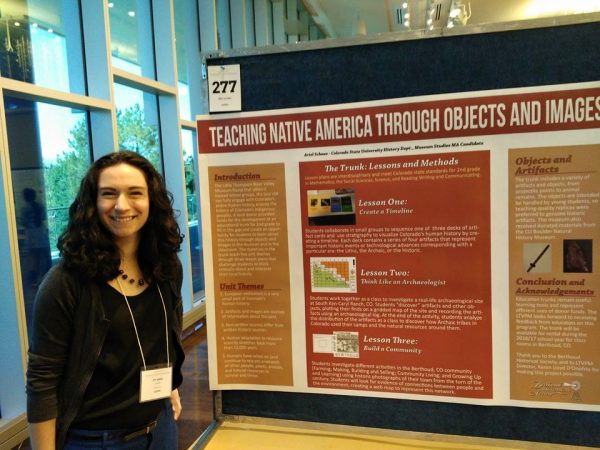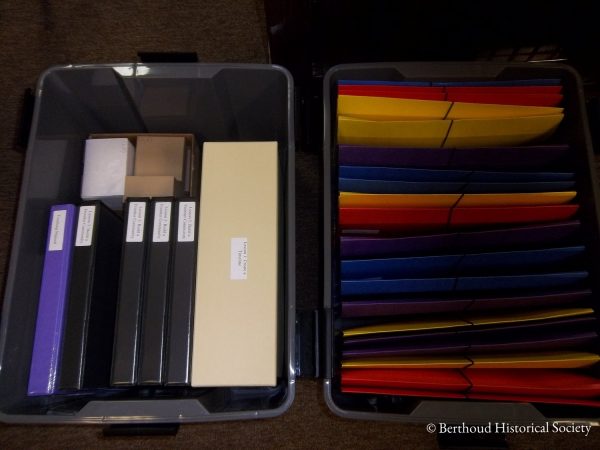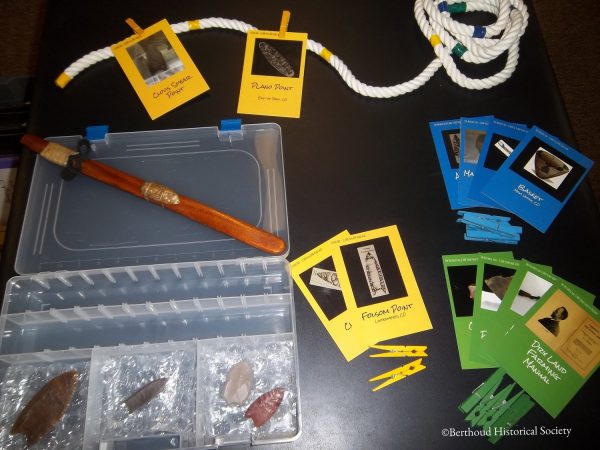
CSU History graduate student, Ariel Schnee, won “Best in Show for Creative Works” and came in second place in the overall competition at CSU’s 2017 Demo Day. She earned a $1000 prize and got to present her project to start-up business leaders, manufacturers, marketers, and funders.
Ariel Schnee studied public history at CSU. Her project, Museum Trunks, helps k-12 students explore moments in U.S. History. The materials in each trunk allow for hands-on investigation that encourage students to think like archaeologists, historians, and museum curators. To learn more about her project, see her projects page.
We got the chance to ask Ariel a few questions about her project and the experience of CSU Demo Day.
How does “Museum Trunks” work as a business?
The business operates on a concept I created called “Order, Learn, Return.” Teachers order the trunk online, students learn from the trunk in the classroom, and return it when their lending period is over. Each trunk contains museum-quality artifacts and replicas, three interdisciplinary lesson plans, and a teaching manual.
What inspired you to create this business project?
Museum Trunks is a response to decreases in funding and the difficulties associated with traditional field trips. The intended client is a school or a school district that has trouble funding a field trip. But the trunks would be beneficial to any kind of educational institution, from schools to rural museums to smaller libraries without in-house educational staff.
What was the CSU Demo Day application like?
I kind of submitted my abstract for Demo Day on a whim as a way to get some more mileage out a project I designed for the Berthoud Historical Society last summer. At the time I was also in the process of looking for museum education jobs, so I was definitely in an entrepreneurial mindset. I was really surprised and pleased when CSU Ventures notified me that they had selected my proposal and seven others for a five-minute pitch at their offices.
And your application was successful!
Once they selected me for Best in Show for Creative Works, I continued to refine the presentation for an oral presentation at Demo Day. Ultimately, I was up against three other proposals including proposals from an engineer, a med student, and a zoology student. The audience voted, and I came in second place overall, winning a $1,000 prize. Since then, I have also been honored with the history department’s Outstanding Graduate Award, and am in the process of setting up a student chapter of the George Wright Society, and have accepted a job offer with the Gregor Allicar Museum of Art at CSU.
Congratulations! Would you recommend Demo Day to other history students?
History students should enter because any historian should be able to challenge themselves to think about their work in new ways. That kind of mental flexibility is absolutely key to what historians do on a daily basis. Re-thinking the work and research I had done for a non-profit (The Berthoud Historical Society in Berthoud, CO) and imagining what that project would look like as a for-profit company was a great mental challenge and opened my eyes to a new way that I could apply historical method and the public history ethic (making history relevant and engaging for a broad audience) to a business and to a marketable product.
What could they gain?
Well, most importantly to a history student, they can actually win some significant prize money! But in all seriousness, they gain an opportunity to speak to a different audience and make connections with people who think about things from different perspectives. I really benefited from working closely with CSU Ventures as I developed my business pitch and oral presentation for Demo Day. Steve Foster and Steve Anders were both incredibly helpful, and I found their advice invaluable. At Demo Day itself, I was really inspired by talking to students who came from disciplines all across campus. I hope to take that interdisciplinary mindset back to my work as a historian and continue to apply it in future projects.
What does the experience help them to achieve that might benefit their coursework or in applying for a Ph.D. program or for a job?
As public funds for universities and cultural institutions grow tighter, that entrepreneurial mindset becomes more and more valuable for people in the liberal arts. Participating in Demo Day and gaining entrepreneurial experience is something that students could use to set themselves apart in their applications, especially for Ph.D. programs. Universities are also looking for people who will bring money and prestige into their institutions, and participating in Demo Day shows a student’s potential for doing both.
Although I’m not an employer, I would imagine that employers look for evidence of creative thinking, problem-solving, and initiative among their employees. Demo Day definitely required me to do all three.

